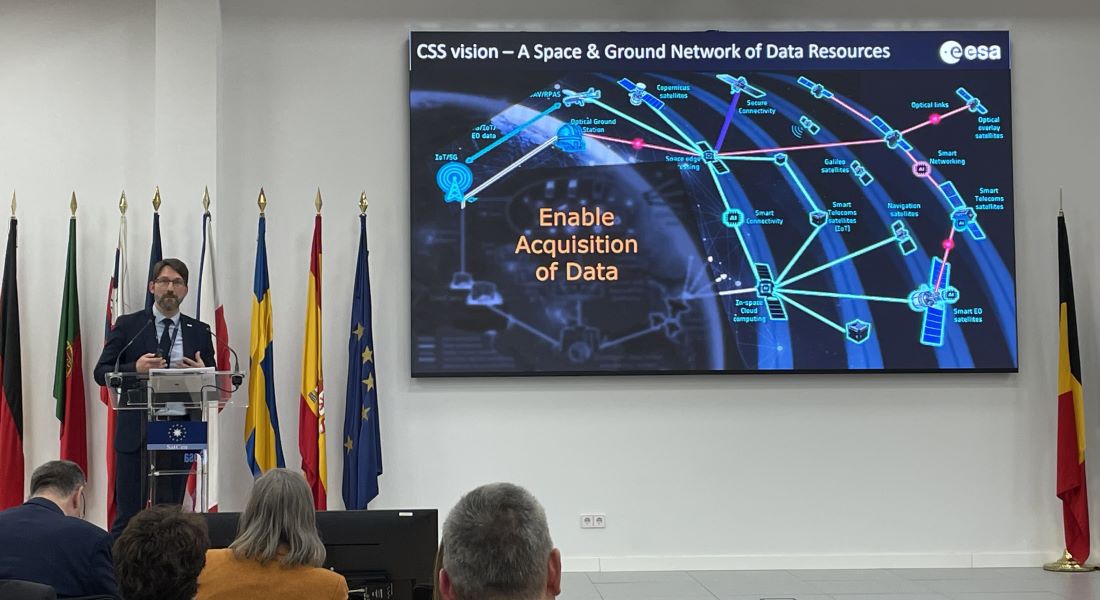
As the impact of geopolitical tensions and climate change challenges continue to be felt around the world, key players in Europe’s space sector came together in Spain this week to define the requirements of a future Space Data Space system for Europe. The two-day workshop, co-organised by ESA and the European Space Policy Institute (ESPI) and hosted by the EU Satellite Centre in Madrid, was convened in light of the central role played by space-based data in preventing, mitigating and responding to these crises.
With the number and intensity of crises rising, a collective European approach is vital. Data spaces - secure and federated IT infrastructures with their own governance frameworks - are currently being established across key strategic domains as part of the European Union’s evolving Data Strategy. With the space sector today producing terabytes of data and satellites representing critical infrastructure for both societies and economies, developing a similar collaborative framework for the space sector within which this data can be securely managed and utilised is imperative.
A preliminary study commissioned by ESA with inputs from Member States, public and private sector stakeholders has identified that establishing a Space Data Space would bring significant added value to the security community and its users in Europe. As well as providing a next-generation secure IT environment for space data drawn from Earth Observation (EO), Positioning, Navigation and Timing (PNT) and satcom technology, it would also enable the interoperability required to optimise the collection, transmission and transformation of this data in a timely manner.
Facilitating space-based crisis management in Europe remains a key priority for ESA, as outlined in its vision for a Rapid and Resilient Crisis Response (R3) Accelerator. Its new Civil Security from Space (CSS) programme aims to work with European and International partners to develop the infrastructure and technology required to deliver this vision, and offers a range of funding and partnership opportunities for interested parties. Recent weeks have seen a series of firsts for the CSS programme, including the signing of a partnership project with ICEYE for the COSMOS project and the first contributing mission to CSS and R3 in an agreement with Open Cosmos, signed during the EU Space week.
Looking ahead, establishing a European Space Data Space, connected with other Data Spaces, will provide the optimum framework for all stakeholders to deliver security and protection in Europe and this week’s invitation-only event set out to do just that, bringing together more than 70 key stakeholders from government, industry, research and user communities to define the requirements of the proposed Space Data Space system.
With speakers drawn from across the sector, Pascal Legai, ESA’s Senior Security Advisor to the Director General, opened a series of high-level keynotes, starting with SatCen Director, Ambassador Sorin Ducaru.
In his keynote speech, Christopher Topping, Programme Manager for ESA’s Civil Security from Space programme, said “Access to information, swiftly, anywhere at anytime is an imperative in times of urgent action…. The Civil Security and Crisis Response challenges are demanding and require a holistic approach to data access and management. It must be secure and trusted, and it must enable the simplification of intelligence gathering and operations, through an embedded smartness in data gathering, processing and distribution.”
Professor Wrochna, President of the Spanish Space Agency, presented the national approach and their “National Satellite Information System.” General Delgado, Deputy of the Spanish Space Agency, echoed the words of Alberto Palomo, Chief Data Officer of the Government of Spain, who was also a keynote speaker at the event: “Data per se is not valuable, it becomes so only if you transform it and make actual use of it.”




